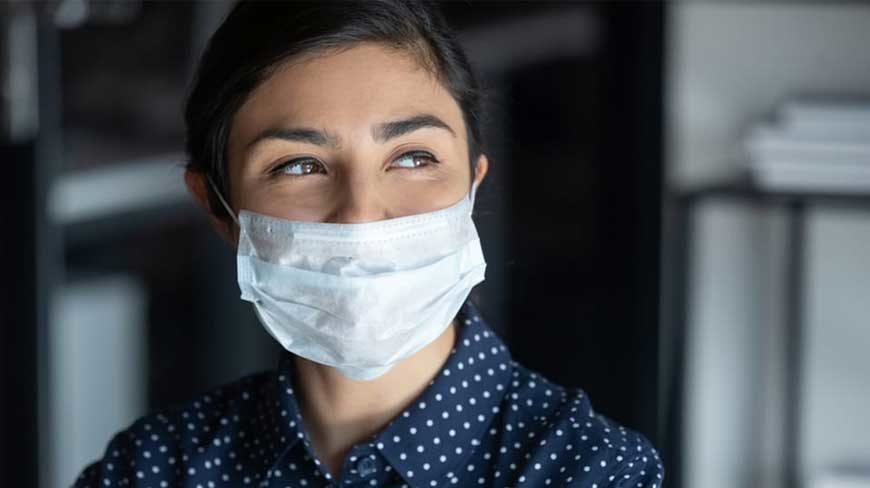How Face Coverings Protect You From COVID-19
In the midst of the global COVID-19 pandemic, wearing a cloth face covering or mask while in public is mandated in many areas. This aligns with the Centers for Disease Control and Prevention (CDC) recommendation that people wear cloth face coverings in public.
Cloth face coverings are not surgical masks or N-95 respirators. You can make cloth face coverings from household items. Medical-grade masks, like N-95 respirators, are the best protection against breath-borne pathogens. They are in short supply and should be saved for health care workers or people who are sick.
It’s important to wear a clothing face covering or mask because it slows the transmission of disease. “Cloth face coverings are intended to keep the wearer from spreading respiratory secretions when talking, sneezing, or coughing,” says Steven Gordon, MD, Chairman of Cleveland Clinic’s Department of Infectious Disease. Some people infected with COVID-19 are asymptomatic (without symptoms) or pre-symptomatic (currently without symptoms but will develop them). People who do not have symptoms of COVID-19 can still transmit the virus.
Cloth face coverings do not prevent viral particles from being inhaled. “However, there is evidence that such masks reduce the exhaled aerosols from infectious, but asymptomatic, individuals,” said Raed Dweik, MD, Chairman of Cleveland Clinic’s Respiratory Institute. “This reduces the viral load in the environment, lowering the chance that anyone will inhale the pathogens.”
It is still important to wear a mask because it prevents the expulsion of particles during coughs and sneezes. “Coughing and sneezing significantly increase the amount of aerosols in an exhaled breath, creating a turbulent cloud that can propel the contents up to 25 to 26 feet. Any type of facemask provides a physical barrier that disrupts this event.”
Non-medical grade masks stop viral particles from being exhaled into the air. “Our normal exhaled breath is comprised of tiny water droplets and fluid from the lining of the lungs that carries dissolved bacteria, viruses, proteins, metabolites, and other compounds. As they enter the air, the aerosols begin to dry and, ultimately, only the dissolved materials remain,” said Dr. Dweik.
“Even though exhaled breath may leak around a face covering that does not fit snugly, two recent journal articles illustrate that the exhaled aerosols and particles collect on the inner surface of the face covering and form a layer that attracts more particles,” Dr. Dweik continued. “The studies were performed on masks long after they had dried, confirming that the contents remained attached to the surfaces after the wet layer had evaporated.”
The studies provided evidence that cloth face coverings trap coronavirus, said Dr. Dweik. “Both studies found a wide variety of endogenous human materials on the disposable masks, including human cytokines. These proteins are much smaller than virions from the coronavirus. If masks made of paper, cotton and other homemade masks are capturing the smaller molecules, it is reasonable to assume they are also capturing the larger SARS-CoV-2 particles.” SARS-CoV-2 is the medical name for COVID-19.
Cloth masks can provide protection in the workplace and other public places as we move from shelter-in-place to recovery. “Cloth face coverings can be used for source control in the workplace as well as in public spaces. They are recommended by the Centers for Disease Control and Prevention to potentially help prevent transmission when used as a complement to social distancing,” said Dr. Gordon.
Social distancing is avoiding crowds and mass gatherings and staying six feet away from others whenever possible. “[Masks] are not a replacement for adequate distancing, and their use and facility should be reconsidered when distancing is not feasible,” said Dr. Gordon.
Medical-grade masks are the best protection because they fit snugly on the face and filter aerosols being inhaled and exhaled. Surgical masks and homemade cloth face coverings still provide some protection. “While they may not protect the wearer from inhaling contaminants such as the coronarvirus, they appear to reduce the viral load exhaled from an asymptomatic wearer,” Dr. Dweik says. “Therefore, wearing a face covering helps protect others from the wearer’s exhaled aerosols, but does not protect the wearer.”


